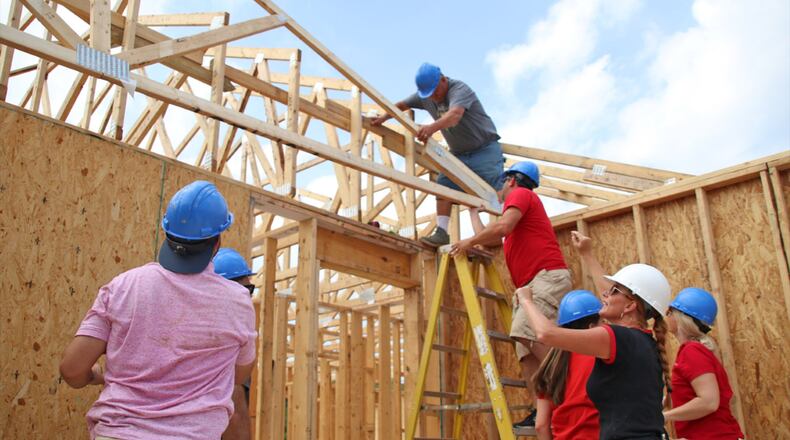“Some place to sleep. Some place to shower. Some place to cook breakfast and fix a meal,” said Rich Barger, a district coordinator for the United Methodist Committee on Relief. “And fairly close to the job site.”
Churches are often best equipped to meet the needs of volunteer groups, said Barger of Celina, but he has also stayed in a schoolhouse and a camp dormitory while helping clean up in Puerto Rico after the devastating 2017 Hurricane Maria.
In Ohio, a record 16 tornadoes touched down on the western side of the state Memorial Day night. The most powerful, an EF4, cut a swath from Brookville to Riverside in Montgomery County.
As of Monday, 612 individuals or families had been entered into a disaster case management system for those unable to recover on their own using insurance or other means. About half the cases are homeowners of which more than two-thirds need help repairing or rebuilding, said Laura Mercer, director of the Miami Valley Long-Term Recovery Operations Group.
A hundred or more volunteer groups — mostly faith-based — will work over the next two and half years to help tornado survivors repair their houses. The first organizations are expected to arrive as temperatures warm this spring, said Sally Dyer with Presbyterian Disaster Assistance.
“We’re finding the people who have unmet needs and who are underinsured. If not for volunteers, they would not be able to move back into their homes,” Dyer said. “That takes time and manpower.”
MORE: ‘Zombie’ properties haunt neighborhoods after tornadoes
Mercer said the recovery operations group is hoping to identify a half-dozen host sites able to house 15 to 20 volunteers no more than 15 to 20 minutes away from disaster areas.
“Most teams will come in for a week or two max. Some teams will be here longterm — for a year,” she said. “They need to be centrally located to areas that have damage. We don’t want people that come in to do volunteer work to spend a lot of time doing transportation going back and forth, because they really want to come here and work.”
But not all churches or other facilities that want to host volunteers may be properly equipped, Dyer said.
“I’ve experienced the good, the bad and the ugly,” said Dyer, who has responded to at least 18 natural disasters. “There is a lot more to hosting than opening up the church … It’s a big commitment.”
Potential host sites need to consider whether local zoning, fire ordinances and insurance coverage prohibits housing people, Dyer said. Another consideration is that while some volunteer groups are all adult, others are youth-focused or intergenerational, she said.
INVESTIGATION: ‘Disaster after the disaster:’ Fighting insurance over tornado damage
Southminster Presbyterian Church in Centerville has already been identified as a long-term host site and will likely see its first volunteers beginning in March with Mennonite Disaster Service members, Dyer said.
But even if a church or other local organization is not able to house volunteers, there are other ways to help, Dyer said.
“You can help prepare meals for them. You can have them to your church for dinner,” she said.
Mercer said the recovery group is looking for hosts for at least the next year, though understands there are times when a church or other facility will be unable to house volunteers due to other activities.
RELATED: Neighbors, many without aid or insurance, rely on each other to rebuild from tornado
Any church or organization interested in housing volunteer groups can contact Mercer at 937-512-4571 or by email at Laura.Mercer@sinclair.edu.
“It’s a great way for an organization to be able to contribute to the recovery of the community just by leveraging the assets they have in terms of their own facilities,” she said. “It’s a nice way to both thank the folks in the community who help with repair and rebuild, meet some great people, and make an impact on our community.”
About the Author

